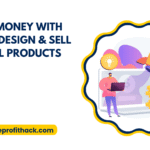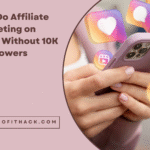Welcome to my article “Affiliate Marketing to Gen Z in 2025: What Works?”.
If you think marketing to Gen Z is as easy as slapping an avocado on toast and calling it a day, think again. This tech-savvy, socially conscious generation is rewriting the rulebook on how brands engage with consumers. By 2025, Gen Z (those born roughly between 1997 and 2012) will wield even more purchasing power, making them a critical demographic for affiliate marketers. But reaching this cohort isn’t about flashy gimmicks or one-size-fits-all strategies—it’s about authenticity, relevance, and, yes, sometimes a good meme.
From choosing the right platforms (hint: think TikTok, not Facebook) to crafting relatable content and leveraging micro-influencers, we’ll cover actionable strategies to help your affiliate campaigns resonate with Gen Z in 2025. So grab your ring light, brush up on your slang, and get ready to connect with a generation that’s setting the tone for the future of affiliate marketing. Spoiler alert: it’s a mix of heart, hustle, and hashtags.
My Best Recommended & Proven Way to Make $100-$300 Daily – Watch This FREE Video to START >>>

Understanding Gen Z’s Values and Behaviors
Let’s get one thing straight: Gen Z is not just “Millennials 2.0.” This generation is a whole new beast—one that thrives on authenticity, demands accountability, and probably has a finsta account you’ll never find. Understanding their values and behaviors is crucial if you want to win them over in 2025. Spoiler alert: generic ads and surface-level campaigns aren’t going to cut it.
For starters, Gen Z is all about keeping it real. This is the generation that grew up with YouTube tutorials and Instagram influencers—they’ve seen every trick in the marketing book and can spot a fake a mile away. To connect with them, you need to ditch the corporate buzzwords and embrace genuine storytelling. They’re not looking for a brand to sell to them; they’re looking for a brand they can believe in. If your affiliate marketing campaigns feel too polished or salesy, expect them to swipe left (metaphorically, unless you’re actually on a dating app—then it’s literal).
And let’s talk about their love affair with sustainability and social justice. Gen Z isn’t just buying products—they’re buying into what a brand stands for. They want eco-friendly packaging, ethical production, and receipts (figuratively and literally) that show you’re walking the walk. This isn’t a “nice-to-have” anymore; it’s a dealbreaker. Your affiliate efforts should highlight products and brands that prioritize these values. And yes, they will Google to confirm you’re not greenwashing.
Lastly, let’s not forget their digital fluency. Gen Z lives online, but not in the traditional sense. They’ve moved from Facebook to TikTok, and from emails to DMs. They thrive in the spaces where they can create, collaborate, and connect. Your job? Meet them there. Speak their language (but don’t force it—using “slay” incorrectly is an instant credibility killer) and engage them in ways that feel natural and meaningful.
In short, Gen Z doesn’t just want to know what you’re selling—they want to know why it matters. If you can show them that your product aligns with their values and fits seamlessly into their lives, you’re on the right track. If not? Well, let’s just say there’s a trending hashtag with your brand’s name on it—and not in a good way.
Choosing the Right Platforms to Reach Gen Z
If you are trying to connect with Gen Z in 2025 and still running Facebook ads, it’s time for a reality check. While Facebook might still work for planning family reunions or arguing with relatives about holiday plans, Gen Z has moved on. This generation thrives on platforms that let them create, express, and consume bite-sized content—and they’ve got a sixth sense for spotting brands that don’t belong in their digital spaces.
First up, TikTok. This platform is the undisputed king of Gen Z engagement, where trends are born, dances go viral, and brands either thrive or fail spectacularly. Want to succeed here? Ditch the overly produced content and embrace TikTok’s raw, unfiltered vibe. Whether it’s funny skits, tutorials, or challenges, your affiliate marketing needs to blend into the platform’s culture. Bonus points if you can leverage a trending sound or meme without coming across like someone’s clueless dad trying to be cool.
My Best Recommended & Proven Way to Make $100-$300 Daily – Watch This FREE Video to START >>>
Then there’s Instagram, the OG Gen Z hangout that’s still going strong. But here’s the twist: static posts are out; Stories, Reels, and interactive polls are in. If you want to catch their attention, focus on visually striking, snackable content. Think aesthetic product shots, behind-the-scenes looks, or influencer endorsements that feel like personal recommendations rather than ads.
Don’t sleep on YouTube, either. Gen Z loves long-form content when it’s informative or entertaining. Tutorials, unboxings, and reviews are goldmines for affiliate marketing. Just make sure the videos don’t scream “ad” louder than a bad infomercial. Subtlety is key—authenticity even more so.
Emerging platforms like BeReal or whatever the next big app will be in 2025 can’t be ignored either. Gen Z loves to explore new digital spaces, especially ones emphasizing authenticity and connection. Keep an eye on these platforms and be an early adopter; nothing says “cool” to Gen Z like being where the crowd hasn’t fully arrived yet.
Finally, don’t underestimate the power of private, conversational platforms like Discord and WhatsApp. Gen Z loves creating tight-knit digital communities where they can chat without the noise of public feeds. If you can find a way to integrate your affiliate marketing into these spaces without being intrusive, you’ll tap into a goldmine of engagement.
In 2025, reaching Gen Z is less about where you show up and more about how you show up. The right platform is just the start—you also need the right tone, content, and strategy to meet them where they are. Play it right, and your affiliate campaigns might just become the next viral sensation. Play it wrong, and you’ll be relegated to the internet’s “cringe” hall of fame. Choose wisely.
Crafting Authentic and Relatable Content
When it comes to Gen Z, the old saying “fake it till you make it” doesn’t fly. This is the generation that grew up with filters, deepfakes, and influencer exposés—they’ve seen it all and won’t hesitate to call you out. If your content isn’t authentic and relatable, you might as well not hit “post.” So how do you craft affiliate marketing content that doesn’t just connect with Gen Z but makes them hit the like, comment, and (most importantly) purchase button?
First, let’s talk about storytelling. Gen Z isn’t here for a bland “buy now” message; they want the why. Why does this product matter? Why does it align with their values? Why should they care? To win them over, your affiliate campaigns need to tell a story they can see themselves in. Think “day in the life” vlogs, genuine testimonials, or hilarious skits that show the product solving a real-life problem (bonus points if that problem is weirdly specific, like finding a coffee mug that doesn’t leak on their overpriced aesthetic desk mat).
Next up: authenticity. This word gets thrown around a lot, but for Gen Z, it’s non-negotiable. They crave raw, unpolished content that feels like it came from a real person—not a corporate marketing team. That means embracing imperfections, showcasing diversity, and being honest about what you’re promoting. Want to lose their trust in 0.2 seconds? Oversell or exaggerate the product benefits. They’ll not only catch on but might even roast you in the comments.
Relatability is equally important. Gen Z wants to see themselves reflected in the content they consume. This goes beyond using trendy slang (please don’t misuse “slaps” or “no cap”) and into creating content that resonates with their experiences. Highlight struggles they face (like balancing school, work, and side hustles), their hobbies (like gaming or thrifting), or their aspirations (like saving the planet while looking fabulous). The more they feel like your product is made for them, the more likely they are to engage.
Finally, user-generated content (UGC) is a goldmine for crafting authenticity. Encourage your audience to share their own experiences with the product and feature them in your campaigns. Not only does this build trust, but it also turns your customers into your biggest advocates. Nothing screams “relatable” like real people hyping up your affiliate products—especially when it’s their unfiltered, slightly chaotic energy shining through.
In the end, crafting authentic and relatable content isn’t about trying to be “cool” or “on trend.” It’s about being real, listening to your audience, and delivering value in a way that feels natural. Nail this, and Gen Z won’t just buy your product—they’ll champion it like the ultimate fandom.
Leveraging Micro-Influencers and Community Engagement
If Gen Z had a motto, it’d probably be something like “Go small or go home.” This is the generation that doesn’t want mega-celebs telling them what to buy—they’d rather hear it from the relatable girl-next-door who also posts about her avocado toast and gym fails. Enter micro-influencers: the unsung heroes of affiliate marketing in 2025. They’re authentic, approachable, and have built the kind of tight-knit communities that Gen Z trusts more than their own horoscope.
So why do micro-influencers work so well with Gen Z? It all comes down to trust. With follower counts in the range of 1,000 to 50,000, these influencers are seen as “one of us,” not untouchable celebrities. They reply to comments, share unfiltered glimpses into their lives, and genuinely engage with their followers. For affiliate marketers, this translates into higher engagement rates and better ROI. A micro-influencer’s shoutout can feel more like a recommendation from a friend than a sales pitch—which is exactly what Gen Z wants.
My Best Recommended & Proven Way to Make $100-$300 Daily – Watch This FREE Video to START >>>
But don’t just throw your product at any influencer who calls themselves “micro.” You need to do your homework. Look for creators whose content aligns with your brand and whose followers match your target audience. A micro-influencer who’s into sustainable living? Perfect for promoting your eco-friendly water bottle. Someone who vlogs about gaming? Ideal for pushing your ergonomic gaming chair. Authenticity is key here—Gen Z will sniff out a forced partnership faster than you can say #sponsored.
Now let’s talk community engagement. Gen Z doesn’t just want to be sold to; they want to feel included. That’s why building a community around your brand is just as important as the influencers you partner with. Use platforms like Discord, Instagram, or TikTok to create spaces where your audience can interact, share their experiences, and feel like they’re part of something bigger. Launch challenges, host Q&A sessions, or create polls that make them feel heard. A vibrant, engaged community doesn’t just boost your credibility; it turns your customers into loyal advocates.
And here’s a pro tip: don’t stop at your influencers’ communities—engage with them directly. Jump into their comment sections, respond to DMs, and repost their content. The more you interact, the more you show that your brand isn’t just about selling a product—it’s about building relationships.
In 2025, leveraging micro-influencers and community engagement isn’t just a strategy; it’s a necessity. Done right, it’s like hitting the affiliate marketing jackpot: authentic recommendations, loyal followers, and a steady stream of conversions. Done wrong? Well, let’s just say Gen Z isn’t afraid to block and move on.
Focusing on Social Responsibility and Transparency
Gen Z isn’t just shopping for products; they’re shopping for purpose. This generation grew up in a world of climate crises, social justice movements, and viral exposés on unethical business practices. So, when it comes to affiliate marketing in 2025, social responsibility and transparency aren’t just nice-to-have—they’re non-negotiable. If your brand isn’t walking the walk, Gen Z will scroll past you faster than a bad TikTok dance.
First, let’s talk about social responsibility. Gen Z expects brands to take a stand—whether it’s committing to sustainability, supporting marginalized communities, or giving back in meaningful ways. And no, slapping a “green” label on your product without proof won’t cut it. They’ll dive deep into your supply chain, Google your CEO’s track record, and call you out if they smell even a whiff of greenwashing. The best affiliate campaigns highlight products that genuinely align with these values. Think fair-trade goods, plastic-free packaging, or brands that donate a percentage of profits to causes Gen Z cares about.
Transparency is just as crucial. Remember, Gen Z is used to clicking through endless content—they know how to spot a fake from a mile away. Whether you’re working with influencers or publishing product reviews, be upfront about affiliate relationships. A clear disclaimer like “This post contains affiliate links, and I may earn a small commission” isn’t just a legal requirement—it’s a trust-building opportunity. Being honest about how you’re making money shows Gen Z that you respect their intelligence and their wallet.
But transparency isn’t just about disclosures—it’s about authenticity in every aspect of your campaign. Don’t oversell or sugarcoat. If the product has limitations, acknowledge them. Gen Z appreciates a brand that keeps it real. For example, instead of saying, “This moisturizer will change your life,” try something like, “This moisturizer is great for dry skin, but if you’re oily, it might not be your best fit.” That kind of honesty can turn skeptical Gen Zers into loyal customers.
Another key to winning Gen Z’s trust? Show receipts—literally and figuratively. Highlight your brand’s social impact through measurable results. Did your company reduce its carbon footprint by 30% last year? Show them the data. Partnering with a charity? Share exactly how much you’re donating and what that contribution will achieve. Gen Z doesn’t just want promises; they want proof.
In the end, focusing on social responsibility and transparency isn’t just good for your conscience—it’s good for business. When Gen Z feels like your brand aligns with their values and respects their intelligence, they’ll reward you with loyalty, advocacy, and conversions. Fail to deliver, and they’ll do what they do best: move on, call you out, and make it a teachable moment for their followers. Choose wisely—your affiliate marketing future depends on it.
Conclusion
Reaching Gen Z through affiliate marketing in 2025 isn’t rocket science—but it does require more than a cookie-cutter approach. This generation is sharp, savvy, and expects brands to meet them where they are, both literally and figuratively. They’re not swayed by gimmicks or generic ads—they want authenticity, social responsibility, and a good reason to spend their hard-earned cash (yes, they’re balancing side hustles and student loans like pros).
The key takeaways? First, understand what makes Gen Z tick: their values, behaviors, and digital habits. They want brands that are real, relatable, and aligned with their ideals. Next, pick the platforms where they actually hang out (hint: it’s not Facebook), and create content that feels organic to those spaces. Authenticity isn’t just a buzzword for them—it’s a baseline expectation.
Don’t forget the power of micro-influencers and tight-knit online communities. These are the digital town squares where Gen Z feels seen and heard. Partner with influencers they trust and engage with their followers like you’re part of the crew, not just an outsider trying to sell something. And whatever you do, keep things transparent and ethical. Gen Z won’t hesitate to call you out if your brand talks the talk but doesn’t walk the walk.
My Best Recommended & Proven Way to Make $100-$300 Daily – Watch This FREE Video to START >>>
In 2025, affiliate marketing to Gen Z is about more than just selling products—it’s about building relationships, creating value, and earning their trust. Nail that, and you’re not just winning over a consumer; you’re creating a lifelong advocate for your brand. Ignore it, and, well… good luck surviving the TikTok backlash.
So, take these strategies, put your own spin on them, and start crafting campaigns that truly resonate. Because with Gen Z, it’s not just about making a sale—it’s about making an impact.
Thank you for reading my article “Affiliate Marketing to Gen Z in 2025: What Works?” till the end. Hope it helped you. See you with another article.










